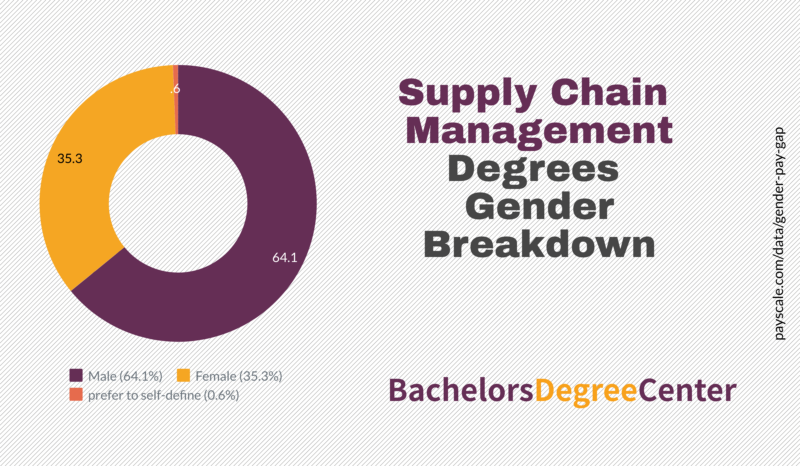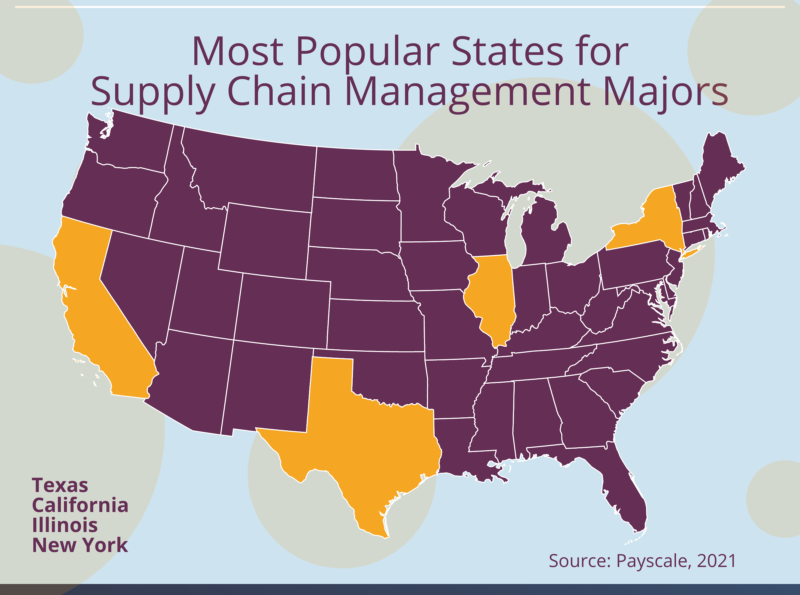Key Information:
- Supply chain management degrees cover essential elements such as planning, sourcing, manufacturing, inventory control, and distribution.
- Students learn about optimizing production efficiency and managing logistics.
- Accredited programs ensure high educational standards and are crucial for transferring credits and pursuing further education. Accreditation can be regional or specialized.
- Graduates can pursue various roles, including project management, leadership, entrepreneurship, and international business, in the supply chain and logistics field.
- Additional certifications, such as those from APICS, give greater career prospects and potential earnings in supply chain management.
From the world events of 2020 and on, everyone in the US has undoubtedly heard the term “supply chain” more than any other time in their lives. But for the last couple of decades, supply chain and logistics management has been one of the fastest-growing and most dynamic fields in the world. Why should you get into supply chain management, and how do you do it?
What is Supply Chain Management (SCM)?
Supply chain and logistics refer to one of the primary business management processes, Supply chain and logistics management is best understood if viewed as a subspecialty against the backdrop of the more significant transportation industry.
Supply chain management is the professional administration of the movement of goods/services. It includes many components that begin with raw material sourcing and end with the delivery of an end product to a consumer.

Supply chain managers and logisticians specialize in the procedural design, implementation, and follow-through of transportation policies that have the capability of meeting consumer needs around the world or across the street.
As you consider the available careers in supply chain management and logistics, be certain you look for the complete answers to these questions before making a final decision –
- What is global supply chain management?
- What is the value of supply chain management in terms of business models?
- What is supply chain management’s value in the modern business model?
Supply chain management is generally broken down into five fundamental elements.
- The Planning Stage – this is the stage where the development of the overall supply chain strategy is developed to ensure production efficiency and to avoid bottlenecks in delivery schedules.
- The remaining stages- Sourcing of Raw Materials,
- Manufacturing and Warehousing
- Inventory Control & Enabling
- Distribution, Delivery &
- Returns) are equally as important, with most companies finding success by implementing easy-to-navigate websites with above-average customer service, quality products, and professionalism.
Accreditation for Supply Chain Management Programs
Finalizing a decision as to a future career or education pathway is a far-reaching decision that may impact your life well into middle age, which easily explains just how fundamentally important this decision is. In the realm of logistics & supply chain management, students should look to enroll in programs and degrees that offer accredited supply chain management courses — maybe even a related internship to apply theoretical knowledge to real-world situations.
The most direct way to determine if the supply chain degree program you are interested in is worth the effort and tuition is to confirm if this supply chain program (or the school) has received accreditation.
Accreditation is the formalized process by which a program or school is evaluated against a set of predetermined criteria set forth by an education agency or industry experts. The formalized process is performed by an independent, neutral organization. It offers potential students the insight they need regarding the quality and specifics of the university, a school within the university, or a specific program.
There are two fundamental types of academic accreditation awarded in the United States. Each of these is discussed below.
Regional Accreditation
Academic, regional accreditation is administered by the United States Federal Government. Regional accreditation is the oldest type of accreditation in the nation – administered by six regional agencies.
CHEA-overseen agencies are responsible for the assessment of a school or college — ultimately issuing accreditation if the school meets the established criteria.
Regional accreditation provides potential degree candidates with certainty regarding the post-secondary school or degree program in which they have a serious interest in attending. Accreditation plays an important role, especially for those students who have plans to transfer to another school and need to bring their earned credits with them to apply to a master’s level program’s requirements.
Specialized Accreditation
In the world of specialized supply chain management programmatic accreditation (i.e., accredited supply chain management courses), relevant programs are generally offered academic specialties related to business and its many inter-related disciplines. As such, specialized accreditation is typically awarded by the business-related accreditation agencies that include the AACSB, the IACBE, or ACBSP, for example., among others.
Types of Supply Chain Management Degrees at the Bachelor’s Level
Bachelor’s degrees in supply chain management are typically completed over a four-year period during which logisticians and supply chain specialists/students learn how to optimize manufacturing and transportation efficiencies. As you consider the various supply chain management degree options, be sure to answer these important and relevant questions before making a final education decision –
- What is a degree in supply chain management, and how long will it take to finish the program if you are studying full-time? Part-time?
- What can I do with a supply chain management degree?
- What is a supply chain management degree, and how do entry-level salaries compare to similar occupations?
- Is there a difference between on-campus or online supply chain management degrees?
- Do online degrees in supply chain management require the same time to complete as their on-campus counterparts?
- Can a supply chain management online degree receive specialized accreditation?

Most degrees in supply chain management will require degree candidates to complete 120–126 semester credits (which is equivalent to 180 quarter credits). Like most baccalaureate supply chain management degrees, students will be tasked with completing a series of general education classes as well core and elective classes related to the degree as well as the student’s interests. Because many supply chain management degrees online (or campus-based) are offered by business colleges/schools, a supply chain management degree is often an academic specialty or supply chain management degree track with a heavy business influence.
The business core curriculum of most degrees in supply chain management help students develop the business skills required to succeed after earning their bachelor’s supply chain management degree.
Concentrations for campus-based or online supply chain management degrees explore these important areas within a traditional supply chain management online degree, to name a few –
- Project Management
Project management is one of the more popular online supply chain management degrees or concentrations which includes coursework delineating the essential supply chain elements of planning, implementing, and measuring business efforts/initiatives. Project management majors learn to accurately identify resources, design budgets and learn to incorporate stakeholder feedback while maintaining schedules that meet deadlines and keep projects on track
- Leadership
Students enrolled in one of the many online degrees in supply chain management with an emphasis on leadership explore classes that include team building, conflict management, and relevant communication.
- Entrepreneurship
These supply chain management degrees provide a cross-disciplinary approach that includes identifying business opportunities and funding sources.
- International Business
Because business operates within a larger global environment, international supply chain management degrees online explore the relationship among international partners following international commerce laws.
Licenses & Certifications in Supply Chain Management
If you are seriously and academically interested in one of the many entry level supply chain management jobs or simply want to be qualified for one of the better-paying supply chain and logistics management jobs, enrolling in one of the many supply chain management certification online programs may offer the most direct path to your career objectives.
With many certifications in supply chain management from which to choose, it is important to ask and answer these essential queries –
- Which supply chain manager certification options would best fit your needs and background?
- Will my supply chain management certification salary differ from my salary before earning the certification?
- Is there one certification in logistics and supply chain management that is preferred by employers that would help land one of the higher-paying jobs in supply chain management and logistics??
Consider the following campus-based or online supply chain management certification options as you begin to refine your thinking about the jobs in operations and supply chain management of interest –
- The Association for Supply Chain Management (APICS) offers these supply chain management and logistics certification options —
- The Certified Supply Chain Professional Certification – CSCP
- The Supply Chain Operations Reference Endorsement ‑SCOR‑P
- The Institute for Supply Management (ISM) offers these certifications in supply chain management –
- The Certified Professional in Supply Management – CPSM
- The Certified Professional in Supplier Diversity – CPSD
- The Council of Supply Chain Management (CSCM) offers several levels of the SCPro certification in supply chain management online and in a traditional classroom.
- The National Contract Management Association (NCMA) – offers a variety of campus-based supply chain manager certification and online supply chain management certification options for industry professionals.
In addition, SOLE – the International Society of Logistics offers various benefits, which include optional supply chain management and logistics certification possibilities. Choosing to earn a certification in supply chain management online or on a nearby campus is an intelligent way to create professional opportunities that may increase your salary.

Logistics and Supply Chain Management Jobs
Entry-level jobs in supply chain management and logistics are present in most economic sectors, although the exact supply chain manager description and each supply chain management responsibilities may differ slightly.
While each economic sector may differ, the roles of a supply chain manager within each will generally be the same. As such, the operations and supply chain management job description for a position in the automobile sector wouldn’t be very different from the supply chain manager job description for someone else working in event management or the supply chain manager tasks for a professional in sports management.
Why Are Operation and Supply Chain Management Jobs So Important?
Supply chain and logistics management jobs (and therefore the supply chain manager job responsibilities) can be applied in a supportive role to almost every business. This is because the fundamental supply chain manager role is to ensure each company meets or surpasses its economic or revenue models/projections. In fact, technological advances have refined the supply chain manager job description and salary options in the recent past, with many specialties that have been created to fill these jobs in operations and supply chain management.
Additionally, it is important to answer these questions about available jobs with a supply chain management degree –
- What is a supply chain manager job description, and does it differ from a logistician?
- Where can you find an accurate supply chain manager definition?
- What does a supply chain manager do; are there supply chain management entry level jobs available with a bachelor’s degree?
- What are the specific supply chain management job requirements for entry level supply chain management jobs?
- Are there entry level jobs in supply chain management that can be done remotely?
- Which jobs in supply chain management and logistics offer the best benefits package?
Simultaneously, logistic and supply chain management jobs work as an important control factor to help mitigate losses and maintain consistent quality in production, which enables you to understand why jobs with supply chain management degree are always in demand. Supply chain management is recognized to be one of the most efficient ways to control manufacturing costs is to ensure manufacturing meets demand – avoiding costly oversupplies or under supplies, which is a prime example of a missed sales opportunity. Logistics and supply chain management is important domestically and internationally.
What Are Available Logistic and Supply Chain Management Job Options?
As noted above, the task or the supply chain manager responsibility list is likely to be similar independent of the supply chain manager description or specific industry. Still wondering how the answer to the question – What is a Supply Chain Manager?, relates to you specifically? Consider these logistics and supply chain management jobs if you hold or plan to pursue a supply chain management degree.
Supply Chain Managerial (SCM) Specialist
Applicants with the skills to fill jobs with a supply chain management degree provide the employing company with the talents required to maximize the business’s manufacturing model. Supply chain managers are an integral part of manufacturing processes that impact the business from product development through the receipt by the end user, the consumer. Supply chain management responsibilities include the capacity to identify and implement optimization procedures regarding safety, productivity, and efficiency.
Warehousing Manager
Warehouse logistic and supply chain management jobs are those individuals who are responsible for overseeing the management and movement of goods in a storage facility. As a warehouse manager, the supply chain manager definition will focus on the management of property, systems, and processes to ensure goods are dispatched as planned and productivity targets are met.
Purchase Manager
Purchasing operation and supply chain management jobs are also advertised as supply managers or publishing directors. Although there are available supply chain management entry level jobs for purchasing managers, the reality is that this position may require some professional experience.
Supply Chain Management Jobs Outlook & Salary Data
According to the fed’s Occupational Outlook Handbook created by the BLS, there were approximately 188,000 professional logisticians and supply chain professionals working in the United States in 2020. The median logisticians and supply chain managers salary for 2020 was $76,270 per year, which translates to median supply change management salaries at the hourly level of $36.67.
Note, the median supply chain management and logistics salary figure represents the statistical point in the supply chain manager salary continuum where a) — there are an equal amount of supply chain management salary employees who earn more than the median supply chain management salary and an equal amount who earn less than the median supply chain management salary.
In addition to this impressive median supply chain manager salary options, the anticipated job growth for a logistics and supply chain management salary is 4% over the next decade, which would create more than 8,000 new supply chain and managerial positions through 2029 a solid supply chain management jobs outlook.
Clearly, the average starting salary for supply chain management for new graduates will depend on their experience, education, and field of interest, but supply chain management starting salary options will likely be near $50,000 per year, with the highest starting salary for supply chain management in the most demand fields.
| Percentile of Operations and Supply Chain Management Salary | Supply Chain Manager Salary– Per Hour | Supply Chain Management Average Salary May 2020 |
| 10% - Represents a Supply Chain Entry Level Salary |
$ 21.25 Per Hour | $ 44,190 per year |
| 25% - represents a supply chain manager salary with limited experience |
$ 27.79 Per Hour | $ 57,810 per year |
| Median – 50% - represents supply chain manager average salary |
$ 36.67 Per Hour | $ 76,260 per year |
| 75% - represents middle level supply chain management and logistics salary |
$47.31 Per Hour | $ 98,400 per year |
| 90% - represents highest levels of supply chain management salaries |
$ 58.93 Per Hour | $ 122,580 per year |
The top-paying states for supply chain management salaries are as follows –
| States w/ Top Supply Chain Manager Salaries |
# of Operations and Supply Chain Management Employees | Supply Chain and Operations Management Salary |
| District of Columbia | 1,130 | $ 97,890 per year |
| Maryland | 5,680 | $ 95,870 per year |
| Alaska | 400 | $ 95,620 per year |
| Delaware | 640 | $ 94,680 per year |
| Virginia | 7,570 | $ 92,150 per year |
The industries and general sectors that are ranked among the top paying for supply chain management entry level salary employees & workers, including some of the highest supply chain management salaries, are as follows –
| Industries w/ Top Supply Chain Manager Salaries | Number of those Employed |
Supply Chain and Operations Management Salary |
| Inland Water Transportation | 60 | $ 120,650 per year |
| Computer/Peripheral | 1,760 | $ 106,970 per year |
| Securities/Commodities/Etc. | 90 | $ 101,590 per year |
| Clothing Stores | ** | $ 96,540 per year |
| Petroleum & Coal | 570 | $ 96,190 per year |
The industries that offer the highest employment levels for those in the logistics and supply chain field are as follows. -
| Supply Chain Manager Salaries w/high employment concentrations | Number Employed |
Logistics and Supply Chain Management Average Salary |
| Federal Exec. Branch | 30,930 | $ 91,260 per year |
| Mgt. of Companies | 17,440 | $ 81,590 per year |
| Mgt. Scientific/Tech. | 14,480 | $ 73,240 per year |
| Aerospace | 9.450 | $ 86,890 per year |
| Computer Systems Design | 6,540 | $ 79,900 per year |
Transportation, Storage, & Distribution Managers Salary Data
Many supply chain degree graduates will find rewarding careers within the many transportation, storage, and distribution sector opportunities –
According to the fed’s Occupational Outlook Handbook created by the BLS, the median 2020 annual salary for transportation, storage, and distribution managers was $96,390 per year, which translates to median supply change management salaries at the hourly level of $46.34. The percentiles for this occupation are as follows -
| Percentile | Average Salary May 2020– Per Hour |
Transportation, Storage & Distribution — Average Salary May 2020 |
| 10% - | $ 27.39/Hour | $ 56,970 per year |
| 25% - | $ 35.43/Hour | $ 73,700 per year |
| Median – 50% - | $ 46.34/Hour | $ 96,390 per year |
| 75% - | $ 60.85/Hour | $ 126,560 per year |
| 90% - | $ 78.91/Hour | $ 164,140 per year |
The top-paying states for transportation, distribution & storage salaries are as follows –
| States w/ Top Supply Chain Manager Salaries |
# of Operations and Supply Chain Management Employees | Supply Chain and Operations Management Salary |
| District of Columbia | 490 | $ 143,510 per year |
| Delaware | 310 | $ 137,460 per year |
| New Jersey | 5,720 | $ 131,540 per year |
| New York | 4,010 | $ 121,720 per year |
| Rhode Island | 270 | $ 121,310 per year |
Professional Organizations in Supply Chain and Logistics Management
Professional organizations are typically developed and maintained by industry insiders and experts who have a mission to ensure the profession’s experienced and novice workers/company owners have the opportunity to improve themselves and the industry they represent.
Many professional organizations offer a variety of membership benefits designed to help new graduates find their professional footing, which ultimately will help them and move past some of the starting salary for supply chain management limitations through mentorship and education opportunities.
In addition, a supply chain management starting salary can be supplemented by employers who offer to pay to further your education
Professional organizations and support companies are designed to support industries – from leaders to companies to working professionals, by advocating for those industry issues in need of legislative change. Options may include, in part, -
- Networking Events
- Employment Boards &Relevant Seminars
- Continuing Education
- Mentoring Opportunities and Advocacy, to name a few.
There are a number of supply chain management professional organizations in America – many of which offer the tools, experience, and potential to help improve the logistic and supply chain management salary for those just beginning their career.
- The Association for Operations Management APICs
- The Institute for the Operations Research & the Management Sciences INFORMS
- The Production & Operations Management Society POMS
- The Institute for Supply Management ISM
- The Supply Chain Council SCC
- The Association for Supply Chain Management ASCM
- The Council of Supply Chain Management Professionals CSCMP
- The Institute for Supply Management — ISM
Related Rankings:
25 Best Bachelor’s in Supply Chain Management
15 Best Online Bachelor’s in Supply Chain Management
10 Fastest Online Bachelor’s in Supply Chain Management
10 Most Affordable Bachelor’s in Supply Chain Management

